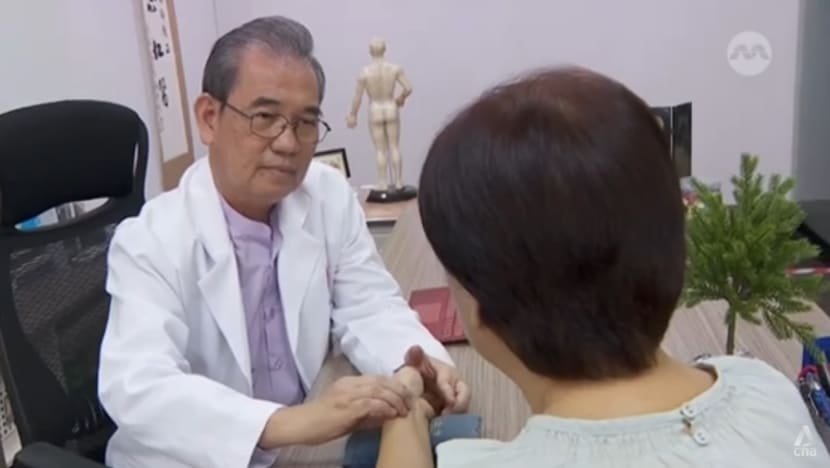Some major TCM chains call for access to national medical records to better help patients
This comes as the Health Ministry looks to integrate traditional Chinese medicine with national healthcare initiative Healthier SG.

A traditional Chinese medicine practitioner treating a patient.

This audio is generated by an AI tool.
SINGAPORE: For years, Thomson Medical Group has been treating patients by using traditional Chinese medicine (TCM) alongside Western medicine.
One vital area where TCM has had a positive effect is fertility, said the private healthcare group’s CEO Melvin Heng.
“TCM practitioners have been working together with the IVF (in-vitro fertilisation) specialists over the years to optimise and improve the reproductive health of our patients, to bring them to a stage where IVF success rates are higher,” Dr Heng told CNA.
With the Ministry of Health (MOH) looking to integrate TCM with national healthcare initiative Healthier SG, Dr Heng said that there will be more validation of the practice and better outcomes.
ACCESS TO MORE DATA
What could help further is TCM practitioners having access to national patient healthcare data, which is currently parked under the National Electronic Health Record, said Dr Heng.
“Both (TCM and Western) physicians require more information about the patient's overall lifestyle therapies, the medications they are taking - whether it is complementary medicine or Western medicine - in order to give them a better shot at enhancing the patient's health,” he added.
Physicians can also provide more targeted treatment if they have more data from diagnostic results in the system, he said.
In the same vein, managing director of Eu Yan Sang Integrative Health Ng Seow Ling said that having an overall view of the medication prescribed to a patient allows TCM practitioners to suggest better treatment methods.
Giving an example, she said: “If the patient is already taking a lot of Western medication, then maybe one of the alternative treatments will be acupuncture instead of herbal powders.”
Last week, Health Minister Ong Ke Yung said TCM is a good way to get more people to join Healthier SG, noting that a fifth of Singaporeans see TCM practitioners.
More than a million people are enrolled in the initiative, which accounts for less than half short of the ministry’s target, said Mr Ong at charity TCM practitioner Public Free Clinic Society's 50th anniversary charity dinner.
WORKING HAND IN HAND
Dr Heng said that TCM is occasionally the first “port of call” for patients in discovering the health conditions they have.
As the practice is not interventional and “reasonably conservative in management”, patients are less hesitant to give it a try, he noted.
“(TCM) plays a very strong role, especially in a very Asian population, where this is something that is part of the vernacular of healthcare treatment options,” he said.
“It's good not to neglect it, because if we do, then we are missing out the opportunity to meet these patients at their point of need, and bring them to this journey about their healthcare and their overall wellbeing.”
TCM physicians are now working with their Western counterparts to learn how both fields can work together, said Ms Ng.
This includes physicians and doctors meeting to understand one another better. A long-term communication channel between both fields can also improve patient care, said Ms Ng.
For instance, a patient diagnosed with high blood sugar by their family doctors could be advised to make lifestyle changes and return for a follow-up consultation in six months.
During that time, patients could visit a TCM practitioner for acupuncture, or even be prescribed herbal medication, she said.
MOH is also exploring how to incorporate certain TCM treatments into public clinics and hospitals. This could mean such therapies may be eligible for subsidies in the future.
Western healthcare and TCM providers will be consulted on possible collaboration models to work out possible roles and workflows.
Through dialogues, the ministry will work with TCM physicians to define an accreditation framework that is expected to be launched by 2026.


















